We are pleased to present our 2024 Audit Transparency Report highlighting our commitment to audit quality and transparency.
In a time of continued economic, climate-related and geopolitical uncertainty, our role as auditors is more crucial than ever. We bring trust to reported information, enhancing the accuracy, reliability, and consistency of that information. This helps drive our capital markets and fosters trust and confidence among investors and society.
This report outlines our approach to maintaining high standards through continuous learning, the integration of advanced technologies, and a culture that understands and prioritises quality. Our human-led, tech-powered strategy combines the expertise of our auditors with cutting-edge tools, enabling us to deliver next-generation audits that build trust in what matters most for our clients and their stakeholders.
The audit profession is undergoing a significant transformation driven by advanced technologies. Our Next Generation Audit programme is at the forefront of this, delivering efficient, robust, and independent assurance for both financial and non-financial information. Emerging technologies, particularly Artificial Intelligence (AI) and Generative AI, are at the heart of this change and alongside our people are significantly enhancing audit quality.
Our focus on technological advancements is complemented by a dedication to skill development. Continuous training in new technologies ensures our workforce remains adept at leveraging the latest tools and methodologies. This commitment to innovation and excellence positions us to navigate the complexities of modern auditing and deliver a great experience for our clients.
NZ Transparency Report
High-quality audits depend on multiple factors, including our people. We are committed to attracting, developing, and retaining talented individuals with diverse skills and perspectives. We strive to create an inclusive work environment for our people where they feel they belong. We are also working to attract people to a future in auditing by collaborating with Chartered Accountants Australia & New Zealand (CAANZ) to create and promote diverse pathways into the profession.
A key focus for us in 2024 was having the subject matter expertise and high-quality work methods in place to meet the needs of our Climate Reporting Entities. Climate risks and opportunities matter to businesses, affecting decisions that impact current and future performance and profitability. The work of our auditors lifts the confidence that our clients and their investors have in sustainability reporting and decision making. Stakeholder expectations and reporting standards have moved fast, and can be complex. We moved rapidly to invest in the growth and skills of our Sustainability Reporting and Assurance team and develop practices that make the regulatory burden easier for our clients.
Our 2024 Audit Transparency Report
PwC is a multidisciplinary firm, however this report is focused on our audit and assurance practice in New Zealand. It is split into two parts covering our year in audit quality and how we work to deliver it.
In this, our first section, we include:
- our Audit Quality Balanced Scorecard for the year to 30 June 2024;
- reflections from our Audit Advisory Board; and
- an overview of our approach to promoting the attractiveness of the audit profession including the developing role of technology and how assurance is evolving to encompass a broader range of responsibilities, particularly in the realm of sustainability.
In Delivering on our commitment to audit quality we cover a range of information, including:
- our policies, systems and processes for quality management;
- how we monitor our work; and
- information on how our firm is governed.
I want to take this opportunity to thank the PwC New Zealand assurance team for their ongoing hard work and commitment over the past year. We continue to expand our team, bringing in new talent and expertise that have strengthened our capabilities while at the same time working to ensure the workloads of our people are sustainable.
We welcome the opportunity to continue the conversation about audit quality through this report and look forward to engaging with you in the coming year.

Rich Day
Assurance Leader
PwC New Zealand
A note from our CEO
PwC’s purpose is to build trust in society and solve important problems. We bring together our expertise in audit, deals, consulting, tax and compliance, with evolving capabilities in areas such as business model reinvention, sustainability and artificial intelligence. Integral to all this is our commitment to driving a strong culture of quality and excellence.
Our approach to building trust is designed to meet rising expectations of transparency, accountability, and stakeholder engagement. It’s about being open and honest around how we operate and do business. It’s also about recognising the importance of independent and external perspectives so we are challenged and held to account.
This report is an example of the work we’re doing to build trust through greater transparency. I’m proud of our audit team and the mahi they have done over the past year to enhance quality and deliver confidence in the capital markets. I’d also like to acknowledge our independent Audit Advisory Board who play a crucial role in providing us with valuable insights and challenge around our audit processes.
As someone who started their career as an auditor, and has spent much of their career focused on assurance, I understand how essential quality audits are for a trusted and well-functioning capital market. Stakeholders must have confidence in the transparency, objectivity, and effectiveness of the audit process. I hope you enjoy reading this report and learning about the progress we are making to achieve just that.

Andrew Holmes
CEO and Senior Partner
PwC New Zealand
What does our Audit Quality Balanced Scorecard tell us?
Our Audit Quality Balanced Scorecard for the year ended 30 June 2024 reveals a number of insights about audit at PwC New Zealand:
The results of our inspections are broadly consistent with those over recent years. This year’s results from our PwC network internal inspections had no non-compliant audit files and one compliant with improvements required audit file which is in line with our objective of having zero non-compliant and minimal compliant with improvements required audit files in these categories.

Other Balanced Scorecard insights include:
- Our culture of collaboration and consultation has continued throughout the year. To ensure our risk and quality team are focused on the most important areas, we continue to develop and refine a number of areas such as reporting templates to aid audit teams, reducing the need for formal consultations.
- The focus on quality by the leaders in our audit practice continues to be acknowledged by our audit teams as illustrated in our Global People Survey and Leadership in Quality survey results.
- Our work on helping our auditors understand the meaning and purpose of their work continues with evidence that our people have an understanding of the importance of their role.
- The challenging macro-economic environment and increasingly complex accounting standards and audit requirements continue to create technical accounting and auditing issues for our audit teams to deal with and a continued increase in the use of specialists and experts, particularly in areas such as impairment, credit risk, going concern and the implementation of a new insurance accounting standard.
- We continue to invest significant time into our independence and ethics training for all client facing staff and partners across the whole firm.
- Our average staff retention rate has remained relatively stable and in line with historic levels.
- We have continued to deliver a significant amount of training for our people, including a focus on transforming our audits and the responsible use of emerging technologies, both virtually and in the classroom.
Audit Quality Balanced Scorecard | For the year ended 30 June 2024
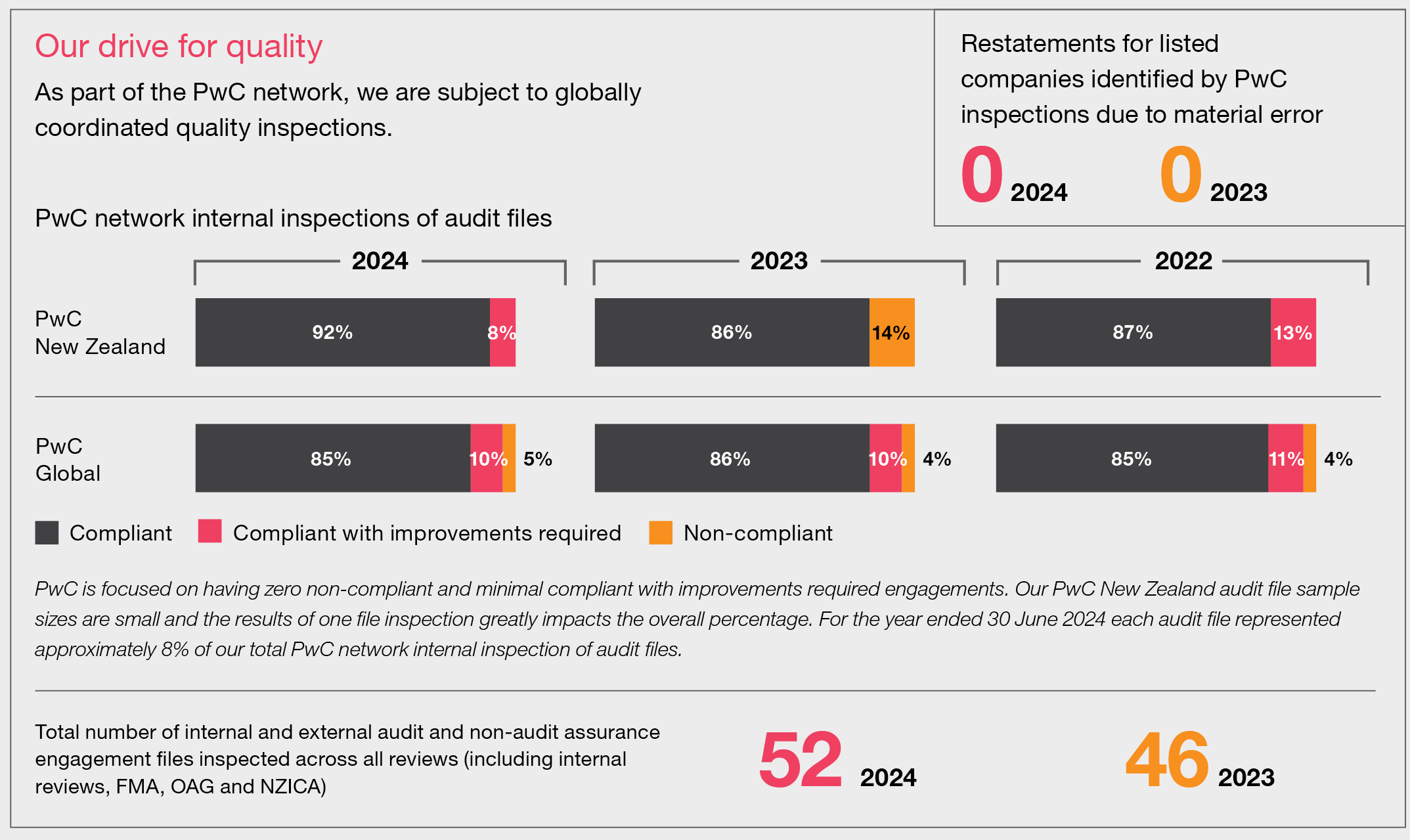


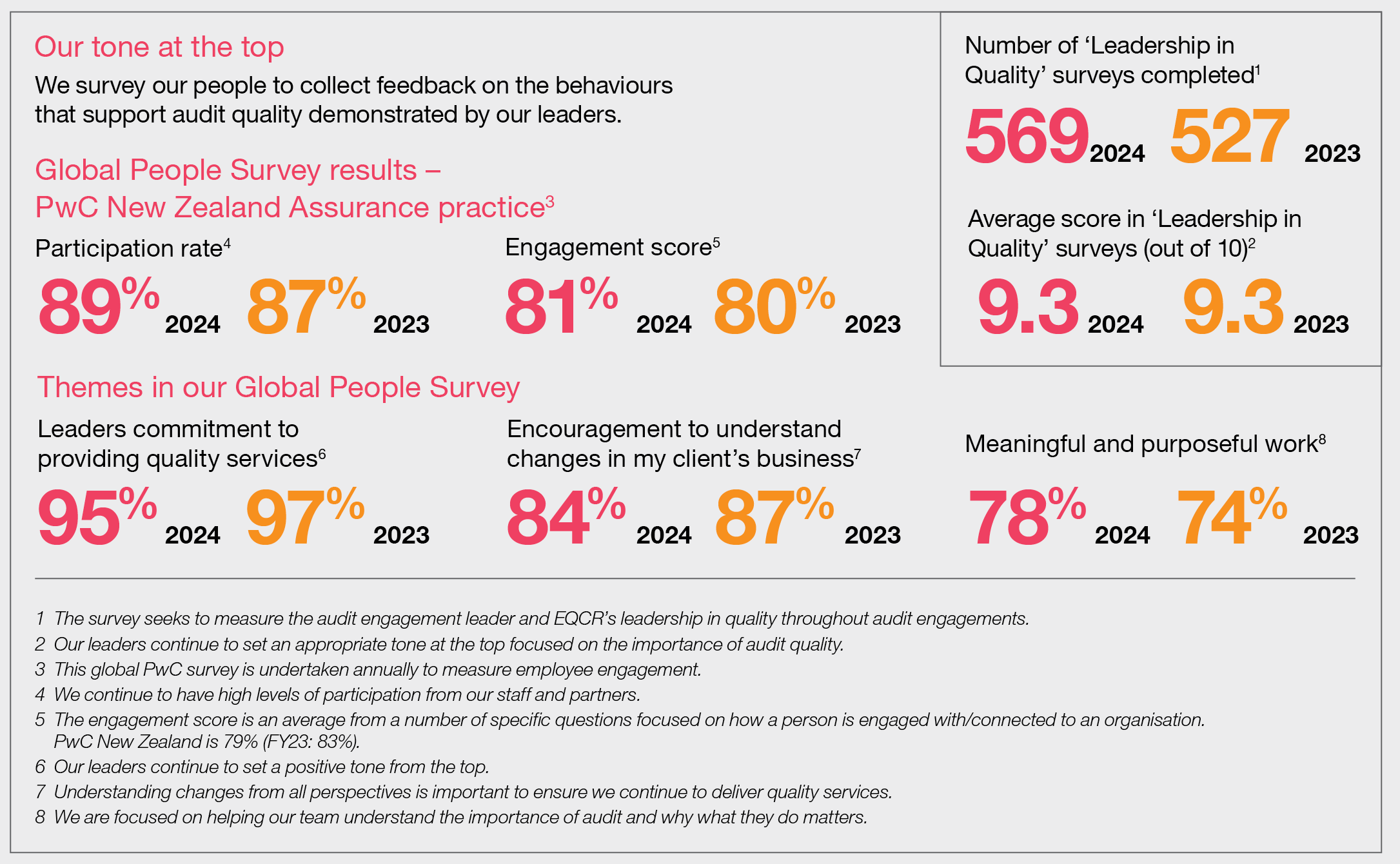



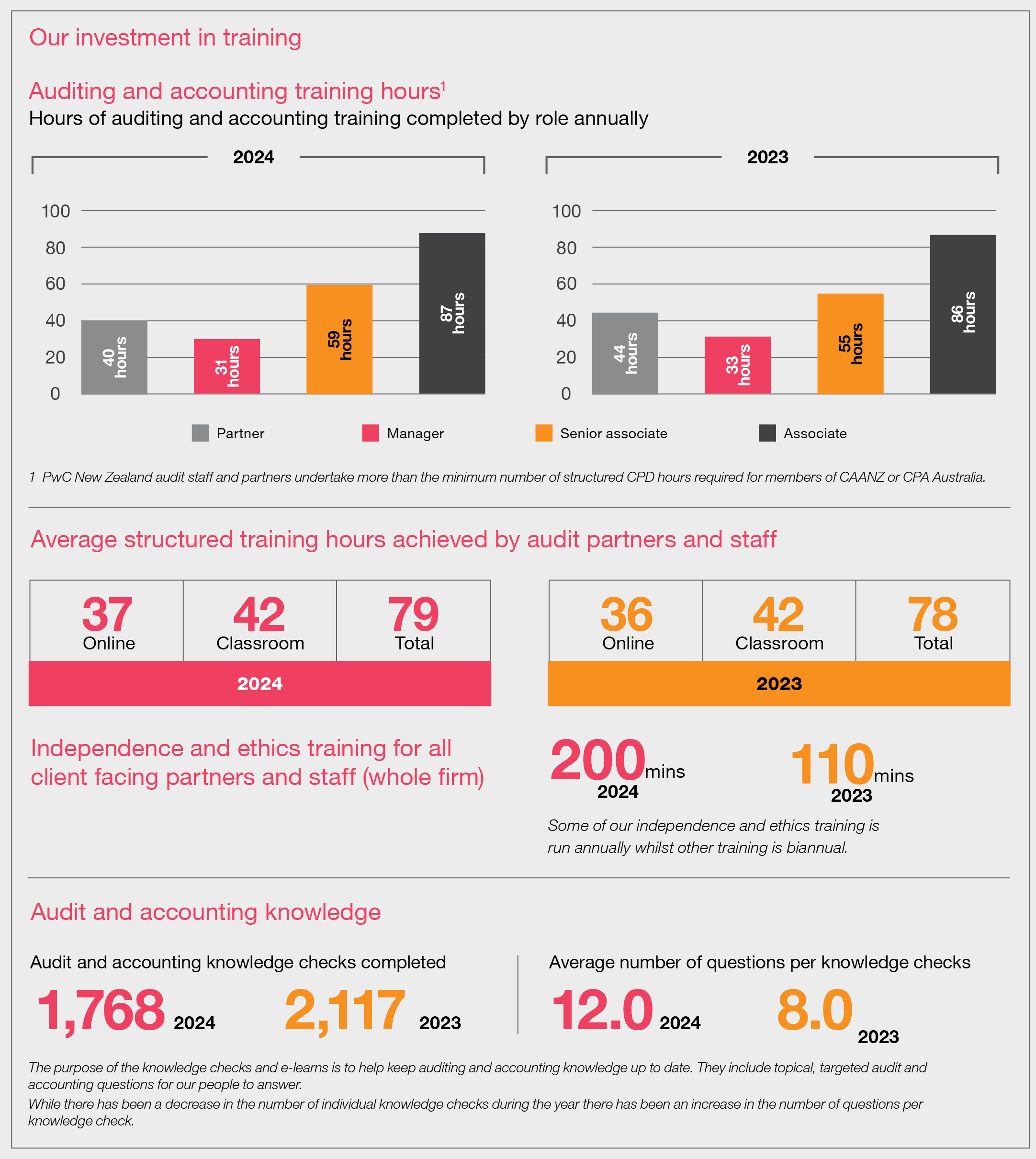
Promoting the attractiveness of the audit profession
We are currently navigating a landscape marked by significant challenges and changes for the audit profession. Globally, there is a shortage of auditors, and a talent supply issue with fewer students choosing to major in accounting.
In response to these headwinds, we have undertaken several initiatives to promote the attractiveness of the audit profession and ensure talented people join our firm. One of these involves working alongside Chartered Accountants Australia & New Zealand (CAANZ) on creating diverse pathways to enter the profession. These pathways accommodate individuals with significant work experience or degrees in non-traditional disciplines, fostering a more inclusive and diverse profession that mirrors the community we serve.
Similarly, we are working with CAANZ to further enhance the profession’s appeal, by engaging students, academics, and educators at both secondary and tertiary levels. This includes developing innovative and practical tools to pique interest in accounting careers and dispel common myths about the profession.
We are committed to fostering an inclusive workplace culture where all our team members can thrive. The wellbeing of our people and the quality of our work goes hand in hand. As part of this we have continued our work to ensure sustainable and flexible workloads for our people while maintaining high quality standards for our clients and stakeholders.
PwC is #AuditorProud
Auditor Proud is a global day recognising auditors and their role. At PwC we recognise the important work our audit teams do over a week long period (23 – 27 September 2024). Read below to find out why some of our team are #AuditorProud and watch their videos here.



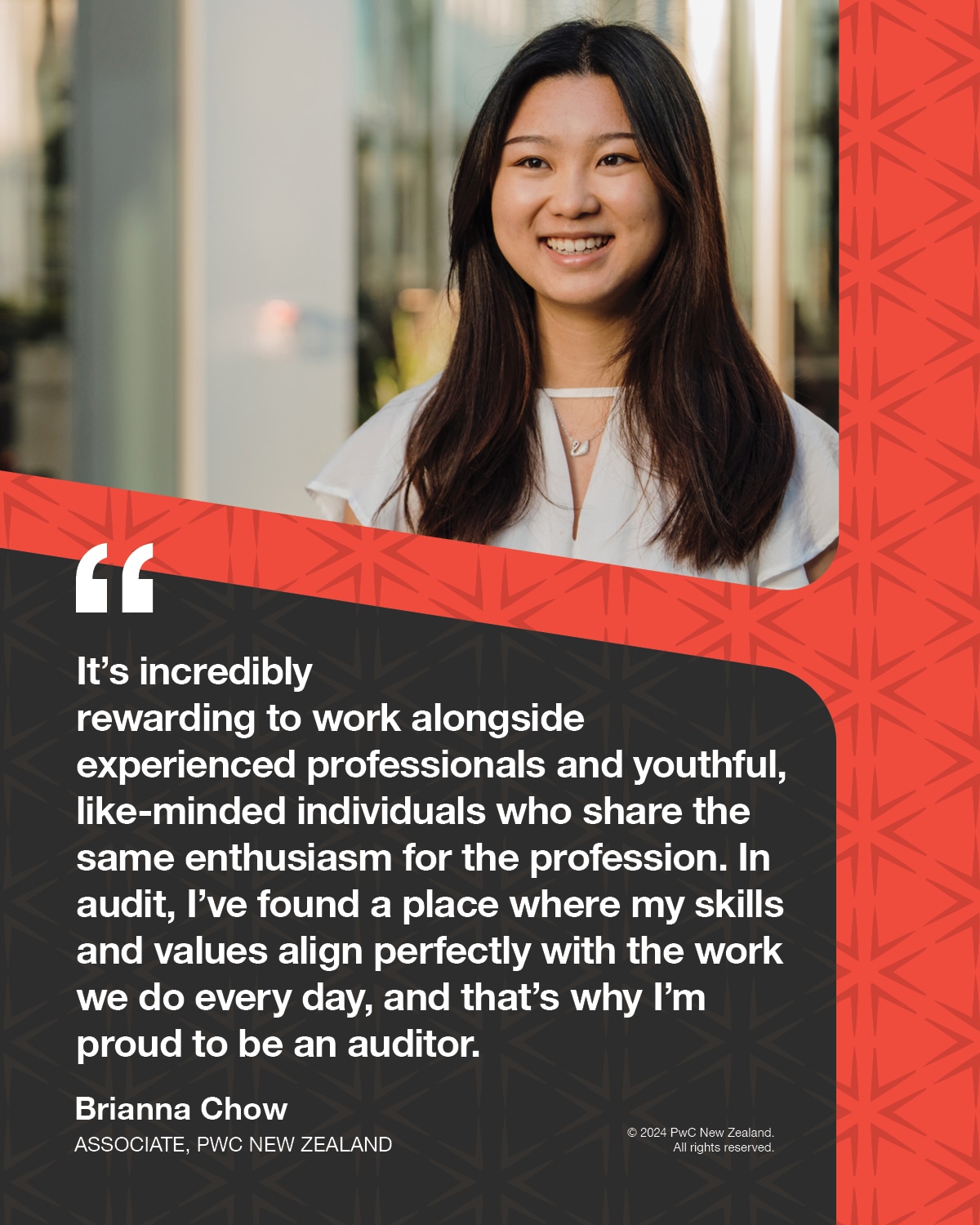
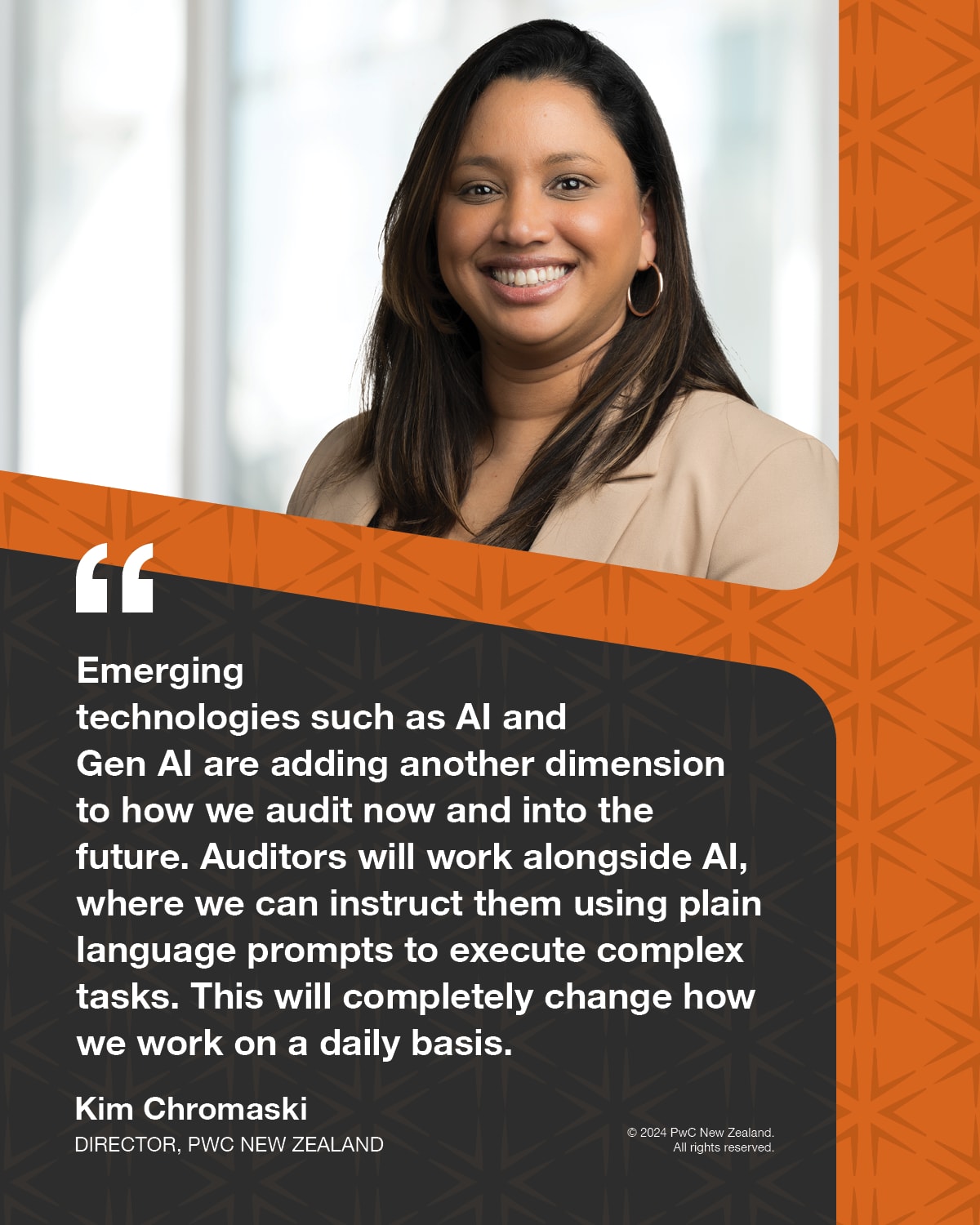
How technology and AI integration is changing audit
The audit profession is undergoing a significant transformation driven by advanced technologies and the complexities of modern business. With businesses collecting vast amounts of data, technology enables quick extraction and analysis, providing valuable insights and allowing for richer, deeper client conversations and more meaningful work.
To keep pace with these changes, we are developing a new global audit platform. This platform aims to standardise, simplify, centralise, and automate audit processes, enhancing audit quality and meeting evolving stakeholder needs. Our Next Generation Audit programme delivers efficient, robust, and independent assurance, over both financial and non-financial information, fostering greater trust with stakeholders.
Emerging technologies, particularly AI and Generative AI, are also changing our auditing process. AI supports the assessment of financial statement disclosures and extends to non-financial information like sustainability reporting. By using plain language prompts, AI executes complex tasks, making daily auditing operations more efficient and insightful.
As the Next Generation Audit programme progresses, we will be continuously introducing new capabilities to improve audit quality and the overall audit experience. In parallel, investments in Generative AI further empower our workforce and drive operational efficiencies. By integrating AI, we enhance our audit processes, ensuring responsible AI usage while maintaining ethical standards.
The predictive and real-time capabilities of AI are reshaping the future of auditing, allowing us to anticipate issues and trends for more proactive and timely interventions. This predictive approach enhances the accuracy and relevance of audits, providing greater value to clients.
Our focus on technological advancements is complemented by a dedication to skill development. Training in new technologies and fostering a culture of continuous learning ensures our workforce remains adept at leveraging the latest tools and methodologies.
How auditors add clarity and confidence to climate reporting
The role of the auditor encompasses a broader range of responsibilities, particularly in the reporting of sustainability. Traditional auditing focused primarily on financial statements, but today, auditors are integral in the transparency of climate-related risks and opportunities. In New Zealand, the requirement for assurance puts a specific focus on greenhouse gas (GHG) emissions reporting.
At PwC, our auditors are a vital support to Climate Reporting Entities (CREs) as they prepare the data, systems, processes and controls needed for GHG emissions disclosures. This involves our early engagement to assess whether the preconditions for assurance are met, giving CREs visibility on the current state of play and allows time to prepare for independent assurance over their GHG emissions. There can be a lot to do, in a short space of time. As an auditor, being involved early on and throughout the process not only improves the people experience between us and our clients, it creates space to plan and execute a well-managed and quality audit.
Stakeholders make decisions based on the information disclosed in companies’ climate statements, so it needs to be clear, relevant, and reliable. When that information is assured, it gives stakeholders an increased level of trust in what they are seeing, and the ability to make decisions with more confidence. We’re proud that the work we do has such a meaningful impact on the companies we work with, the stakeholders of our capital markets and provides an extremely rewarding career opportunity for our people.
Investigating climate reporting
Part of our focus on audit quality includes raising awareness about financial reporting and the significance of audits. Recently, we have explored how climate change is represented in the financial statements of the NZX50.
Since 2022, we have explored NZX50 companies and their journey to adopt the Aotearoa New Zealand Climate Standards (NZ CS).
This year we looked into December 2023 and March 2024 reporters. These are the first wave of reporters to mandatorily prepare their climate-related disclosures in compliance with the NZ CS issued by the External Reporting Board (XRB) after they became effective in January 2023.
Developing a Climate Statement is a complex undertaking for any organisation. Preparation of compliant disclosures requires significant time, expertise and engagement across the business. We will continue to share insights as we closely monitor NZX50 companies applying the NZ CS.

Partner, Sustainability Reporting & Assurance Leader, Auckland, PwC New Zealand
+64 21 355 879
Victoria Ashplant
Exploring investors’ expectations of sustainability reporting and assurance
PwC’s Global Investor Survey provides a snapshot of investor sentiment about sustainability reporting and assurance. The survey captured the perspectives of investors across 30 countries and territories, including those with interests in our local market.
Key findings for New Zealand from the survey reveal that:
- 100% of investors believe corporate reporting includes some unsupported claims about sustainability performance.
- 89% of investors urge companies to disclose their societal and environmental impacts, both current and future.
- 86% of investors advocate for the integration of environmental, social, and governance (ESG) factors into corporate strategy.
These insights offer a unique glimpse into investor priorities and underscore the importance of transparent, accountable sustainability practices in Aotearoa New Zealand.
Partner, Sustainability Reporting & Assurance Leader, Auckland, PwC New Zealand
+64 21 355 879
Victoria Ashplant
External inspections and investigations
PwC New Zealand is subject to regular inspections by regulatory and professional bodies.
FMA regulator inspection
The firm is reviewed annually, and was included in the Financial Markets Authority (FMA) 2024 inspection cycle. The FMA inspected three engagement files and reviewed the quality control systems and processes in place – our system of quality management (SoQM). The findings from the 2024 FMA inspection of PwC and other firms will be included in the FMA’s annual Audit Quality Monitoring Report to be issued in November 2024.
OAG inspections
The firm is also subject to reviews by the Office of the Auditor-General (OAG) for engagements that are completed on its behalf. During the year ended 30 June 2024, the OAG inspected two engagement files for one audit partner, who is an OAG Appointed Auditor. Of particular interest to the OAG is improving the quality of Statement of Service Performance audits.
New Zealand Institute of Chartered Accountants (NZICA) inspections
The firm is periodically reviewed by NZICA. The most recent review was in October 2023. This review is broader than just audit files and also covers aspects of the firm and services provided outside of Audit. The review considers both a selection of engagement files and aspects of our SoQM.
NZICA investigations
At any time there may be matters in progress which are dealt with on a confidential basis.
What is audit quality? At PwC, ‘audit quality’ means that we consistently:

Comply with ethical and auditing standards.

Respond to changes in the audit profession.

Apply a deep and broad understanding of our clients’ businesses and the financial environment in which they operate.

Exercise professional scepticism.

Upskill our people on how to use new technology and tools.

Use our experience and expertise to identify and resolve issues in a timely manner.

Focus on the wellbeing of our people and invest in their development.
Audit Advisory Board Report 2024
PwC New Zealand’s Audit Advisory Board was formed in September 2020 to provide independent advice to PwC New Zealand on enhancing audit quality and to challenge the firm to continuously improve how it delivers audits.
In this section of the report, we share a summary of the Board’s considerations related to audit quality at PwC New Zealand. It marks the completion of the initial four-year term of the Audit Advisory Board.
The Board is chaired by Warren Allen and includes Stephen Layburn and Alison Posa. The report was finalised in November 2024.

Warren Allen,
Chair

Alison Posa

Stephen Layburn
Notable themes in the Audit Transparency Report
The Audit Advisory Board acknowledges a number of themes in PwC New Zealand’s Audit Transparency Report, specifically:
- The attractiveness of the profession: PwC New Zealand’s commitment to attracting, developing, and retaining talented individuals with diverse skills and perspectives, their efforts to build and develop an inclusive workplace culture with sustainable workloads and collaborative work with CAANZ to explore different pathways into the audit profession.
- The developing role of technology in assurance: The impact of PwC New Zealand’s human-led, tech-powered and data enabled approach to combine the expertise of their auditors with cutting-edge tools, deliver next-generation audits that enhance their reputation for audit quality whilst increasing efficiency.
- The broadening role of assurance professionals: PwC New Zealand’s work to grow and develop the skills of their Sustainability Reporting and Assurance practice group in response to (and in advance of) the compliance obligations of their clients in developing areas such as climate reporting.
Audit Advisory Board observations
The Audit Advisory Board has made a number of observations that support the conclusion that PwC New Zealand’s emphasis on audit quality has continued with a demonstrated pattern of improvement:
- Improved audit quality metrics: Continuous improvements across various audit quality metrics, supported by positive outcomes from external regulatory and peer review processes, including reviews by the Global network, FMA, OAG and NZICA.
- Positive review findings: Review processes resulted in no adverse themes or systematic concerns, even with the implementation of the new ISA (NZ) 315 Revised standard. Notably, smaller audits also showed significant improvement.
- Independence testing and quality dashboard: Continued roll-out of personal independence testing for partners and staff, along with the use of an extensive audit quality dashboard and a Quality Improvement Plan.
- Adoption of new technology: Greater use of new technology to enhance support for audit judgements, moving from sampling techniques to testing entire populations of client data, and improving interaction with client IT systems.
- Learning and development: Emphasis on learning and development with dedicated professionals using advanced tools and strategies to engage a diverse workforce and meet the growing demands on the audit practice.
- Staff retention and work-life balance: Efforts to retain skilled staff amid competitive pressures, while managing workloads so they are sustainable for staff and ensuring timely delivery of audit assignments.
- Attractiveness of audit profession: Initiatives to enhance the attractiveness of the audit profession and develop staff careers have shown positive results in recruitment and employee engagement levels.

Progress to date on previous recommendations
The progress witnessed on the key recommendations by the Audit Advisory Board can be summarised as:
| Recommendation 1 | Progress |
| Continue focus on rebalancing the workload to improve staff engagement, while maintaining the financial sustainability of the audit practice – including by continuation of initiatives already underway to both drive efficiency and improve quality. | A primary focus continues to be ensuring the workloads of personnel are sustainable and all PwC’s partners, along with a dedicated resourcing team, have specific accountability and objectives to do so. |
| Recommendation 2 | Progress |
| The occurrence of non-compliant file reviews highlights the importance of continually reinforcing audit quality processes. Significant enhancements over the past four years have led to the processes being seen as highly effective. While progress on maintaining independence is encouraging, the processes require constant reinforcement, impactful training, communicating expectations on engagements and timely review. Ongoing attention to root cause factors should ensure the file review outcomes for this reporting period will be seen as an aberration and not a pointer to a trend. | We note that, for 2024, PwC achieved strong results across all forms of engagement file reviews, and recorded no non-compliant files through the PwC network inspections process, as well as strong results across external inspection of audit files – indicating a robust response to the isolated issues from 2023. Further, the root cause analysis performed in 2023, encouragingly, did not identify any systemic or pervasive matters. Continual attention to the causal factors remains a key focus, however. |
| Recommendation 3 | Progress |
| Against the background to Recommendations 1 and 2, including the outcome of the file reviews, a common theme observed for audit quality issues was shortcomings in review and supervision. Whilst acknowledging the challenges faced – this is one of the most significant audit quality procedures and it must be given timely due attention during all phases of the audit. Reinforcement, allocating sufficient time, achieving a balance between client-specific knowledge and objectivity and a strengthening of the cultural commitment to this specific quality procedure should see the achievement of the expected level of consistency. | As noted above, 2024 engagement file review results have been excellent. The 2024 root cause analysis did not indicate systemic findings in this area. However, messaging, training and reminders to teams continued in this area, including during the 2024 annual Audit Quality Program training for senior associates and above. Current initiatives are also part of the Career Development Pathway (CDP), integrated into career development and recruitment strategies. In November the ‘Leading Teams’ training for managers, now called ‘Elevate Your Impact’, will be delivered again - which includes sessions on soft skills, coaching, review and holding difficult conversations. This will further enhance review and supervision requirements. |
2024 recommendation
The Audit Advisory Board, building on the work over our initial four-year term, makes a further recommendation for consideration by PwC New Zealand.
Over the initial four-year term, PwC has significantly invested in technology to enhance the sustainability of audit practices. This includes tools for testing entire populations of client data and integrating technology into learning and development. With the rise of generative AI, PwC acknowledges the need for human involvement to manage opportunities and risks. The Audit Advisory Board suggests that PwC should work closely with clients and audit committees to understand these opportunities and risks, ensuring a collaborative approach to the future of audit.
The next term of the Audit Advisory Board
We have considered the themes that could be explored by the Audit Advisory Board going forward. These are posed as a series of questions:
- How does PwC New Zealand’s audit practice continue the integration of technology and the implications of this pathway for delivery models, ways of working - and the need to ensure that clients keep pace with the journey?
- How to continue to foster a culture of quality in a new generation of team members, including those based overseas, who have different career expectations and experience?
- How to ensure independence remains top of mind across the firm and embed compliance (both systems and mindset) in ways that are manageable?
- In relation to the developing specialty of Sustainability Assurance how do the quality management systems continue to be adapted to developing risks in this area?
- What will the future audit landscape look like in New Zealand and how should PwC be positioned in this?
“We are supporters of PwC’s initiative of establishing the Audit Advisory Board. Our experience over this initial term of PwC New Zealand’s response to our work has shown the benefit of independent, challenging, and at times detailed, input into the multi-faceted system of audit quality. Consequently, we consider that the maintenance and future development of the Audit Advisory Board initiative will be beneficial to PwC New Zealand’s continued quest for outstanding audit quality. We have seen significant change from a concerted effort by PwC New Zealand’s audit practice to make improvements, across the board, but focused on audit quality. We also see a shared appreciation that maintaining and enhancing what have often been hard-fought gains will require continuous and challenging efforts into the future.”










